OCZ Vector 150 (120GB & 240GB) Review
by Kristian Vättö on November 7, 2013 9:00 AM EST- Posted in
- Storage
- SSDs
- OCZ
- Indilinx
- Vector 150
Random Read/Write Speed
The four corners of SSD performance are as follows: random read, random write, sequential read and sequential write speed. Random accesses are generally small in size, while sequential accesses tend to be larger and thus we have the four Iometer tests we use in all of our reviews.
Our first test writes 4KB in a completely random pattern over an 8GB space of the drive to simulate the sort of random access that you'd see on an OS drive (even this is more stressful than a normal desktop user would see). I perform three concurrent IOs and run the test for 3 minutes. The results reported are in average MB/s over the entire time. We use both standard pseudo randomly generated data for each write as well as fully random data to show you both the maximum and minimum performance offered by SandForce based drives in these tests. The average performance of SF drives will likely be somewhere in between the two values for each drive you see in the graphs. For an understanding of why this matters, read our original SandForce article.
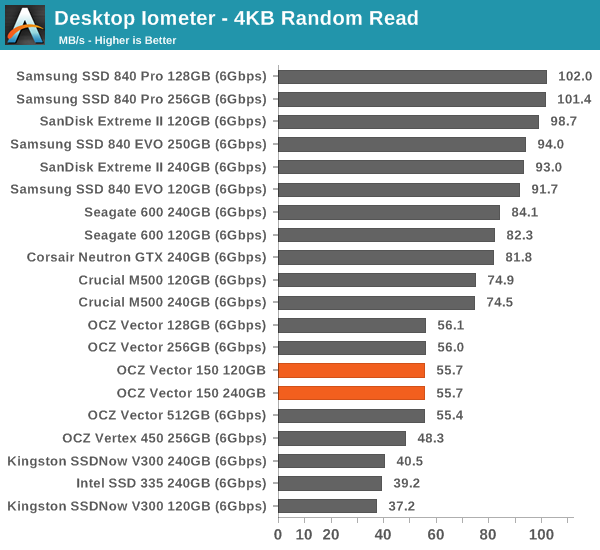
Random read performance remains unchanged but the Vector 150 wasn't supposed to bring any improvements to that anyway.
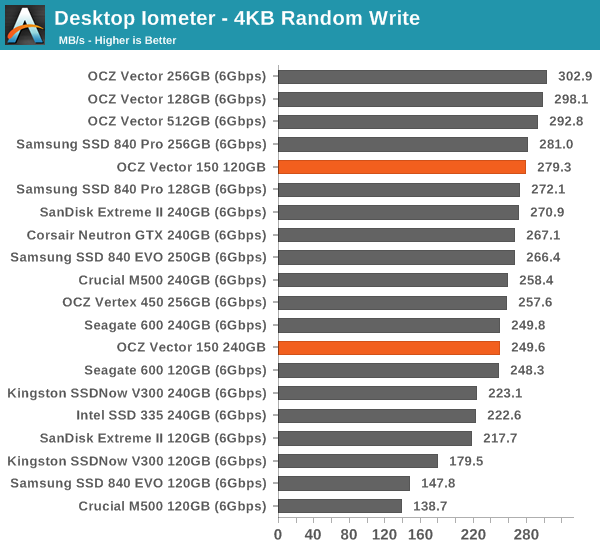
Random write speeds at queue depth of 3 take a hit, though I'm thinking this might be due to the new smaller process node NAND. When the queue depth is increased to 32, the performance is on-par with the original Vector thanks to parallelism.
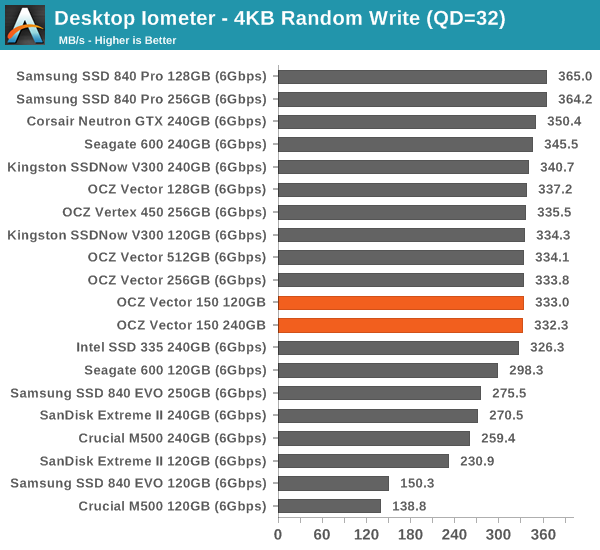
Sequential Read/Write Speed
To measure sequential performance I ran a 1 minute long 128KB sequential test over the entire span of the drive at a queue depth of 1. The results reported are in average MB/s over the entire test length.
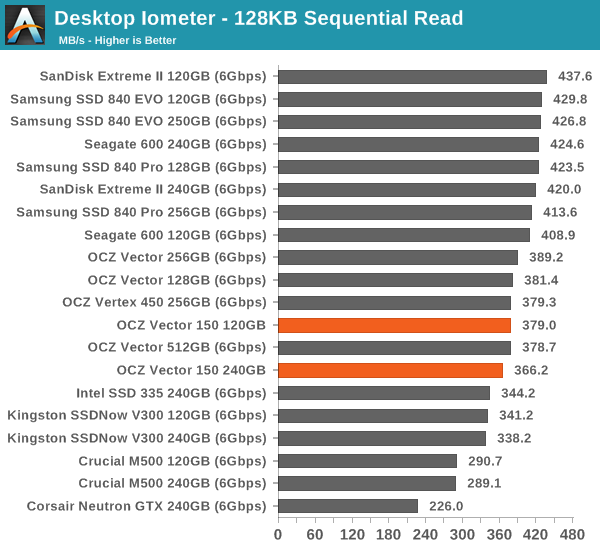
No surprises here either. Sequential performance has remained mostly the same for the last year or so and we won't see another bump until M.2 and other PCIe-based designs get more popular.
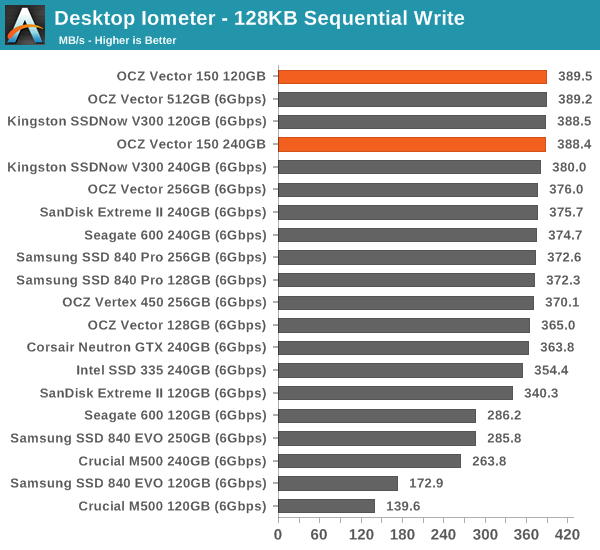
AS-SSD Incompressible Sequential Read/Write Performance
The AS-SSD sequential benchmark uses incompressible data for all of its transfers. The result is a pretty big reduction in sequential write speed on SandForce based controllers.
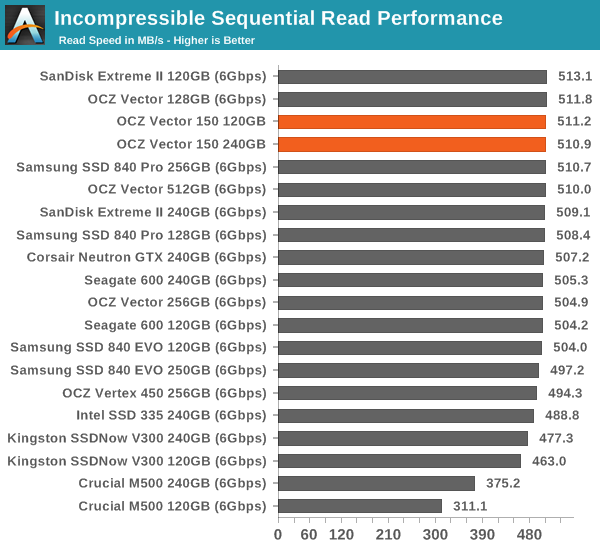
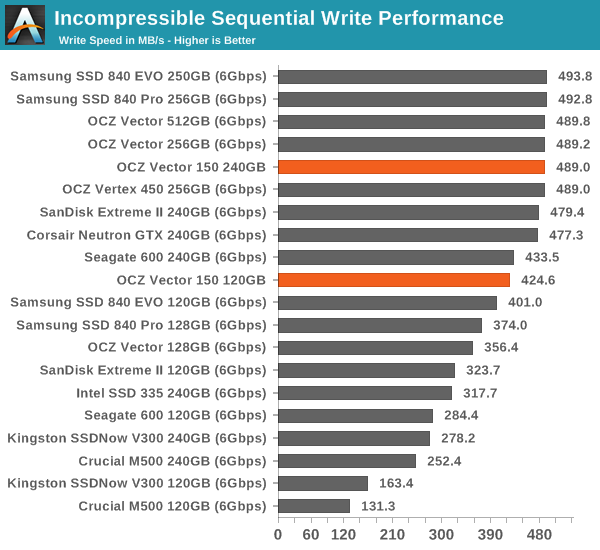










59 Comments
View All Comments
Kristian Vättö - Friday, November 8, 2013 - link
Actually, I've already tested the Intel SSD 530 and am just waiting for Intel to confirm a few things so I can push the review live. I didn't want to include the results here as it kind of ruins the idea of a review if all the scores have been published beforehand. But you should expect the review to surface early next week :)HisDivineOrder - Thursday, November 7, 2013 - link
OCZ's been taking a beating in profits. If you look at the sheer number of refurb deals on OCZ drives as of late, it looks like they're dumping their inventory at reduced prices with virtually no warranties, hoping to clear out warehouses. They're trying to make a quick buck in a hurry because their stock is taking a beating after their profits didn't line up.I'd say this might be one of the last times you read an OCZ SSD review.
Bob Todd - Thursday, November 7, 2013 - link
My only truly horrid SSD experience has been with an Agility 4. Data corruption, randomly not even appearing in the BIOS (on common Intel SATA controllers), etc. RMA'd it once. The replacement did the same thing. RMA'd that one too. The third one is just as bad, and it's sitting in a desk drawer until I get around to sending it back yet again. That's with the latest firmware. Completely anecdotal of course, but 3 bad drives in a row from OCZ when I've never had similar issues with a larger set of drives from Crucial, Plextor, and Kingston.Souka - Thursday, November 7, 2013 - link
Reminds me of the Hitachi Deathstar...er Deskstar drive series... click click clck...gus6464 - Thursday, November 7, 2013 - link
Who in their right mind would buy an OCZ drive over a Samsung, Intel, Crucial, Sandisk, Plextor?wonderblue - Thursday, November 7, 2013 - link
I must be the only person on the planet who bought an OCZ SSD and didn't have it fail.128GB vertex 3 going strong for a year so far.
killerroach - Thursday, November 7, 2013 - link
I still boot my desktop off of a 60GB Vertex. Not a Vertex 3, Vertex 2... original Vertex. Still going strong.evonitzer - Friday, November 8, 2013 - link
Yeah, I feel like I'm the luckiest guy around with my OCZ. Or else (gasp!) these comments exaggerate the situation a wee bit.kmmatney - Friday, November 8, 2013 - link
I still have a 60GB Agility 2 running fine, although I've been using it as a giant external USB memory stick for the last year (using a USB to SATA adapter that came with a Samsung SSD). It's work amazing as a memory stick, copying files at about 30mb/sec on USB 2.Gigaplex - Friday, November 8, 2013 - link
My Agility 3 is still going too *fingers crossed*